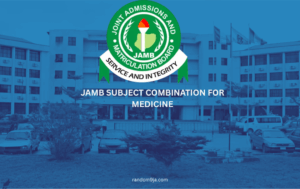JAMB Subject Combination for Medicine – 2026/2027

Medicine and Surgery is one of the most prestigious, competitive, and highly sought-after courses in Nigeria. Every year, tens of thousands of students apply for Medicine in federal, state, and private universities. However, only a small number get admitted, often not because they are not brilliant, but because they failed to follow the correct admission requirements.
One of the most common mistakes is choosing the wrong JAMB subject combination. In JAMB, a single wrong subject can disqualify you, no matter how high your score is. That is why understanding the right subjects for Medicine and Surgery is crucial.
This detailed guide explains everything you need to know, including:
-
The correct JAMB subject combination for Medicine
-
WAEC/NECO subject requirements
-
UTME cut-off marks for Medicine
-
Post-UTME expectations
-
Top universities offering Medicine in Nigeria
-
Direct Entry requirements
-
Career opportunities
-
Tips to increase your chances of admission
-
Common mistakes aspiring medical students make
Let’s get started.
What Is the JAMB Subject Combination for Medicine and Surgery?
The correct JAMB subject combination for Medicine is:
-
Use of English (Compulsory for all UTME candidates)
-
Biology
-
Chemistry
-
Physics
These four subjects are required by all Nigerian universities offering Medicine and Surgery (MBBS). No university accepts substitutes such as Agricultural Science, Further Mathematics, or Health Science in place of Physics, Chemistry, or Biology.
Why These Subjects Are Required
Medicine is a science-based and highly technical field. The subjects are required for the following reasons:
Use of English:
Medical students must understand questions, communicate effectively, and write academically.
Biology:
This provides the foundation of human anatomy, physiology, genetics, cells, and bodily processes.
Chemistry:
Understanding chemical reactions and biomolecules is essential for medical pharmacology, biochemistry, and pathology.
Physics:
Physics plays a major role in radiology, medical equipment, optics, sound waves, fluid mechanics, and general medical diagnostics.
Any student who avoids these core science subjects cannot succeed in medical education, hence their importance.
WAEC/NECO Subject Requirements for Medicine
To study Medicine and Surgery, you need at least five (5) credit passes in WAEC, NECO, or GCE in no more than two sittings.
The compulsory subjects are:
-
English Language
-
Mathematics
-
Biology
-
Chemistry
-
Physics
These subjects must be Credit level (C6 or above). A Pass (D/E/F grade) in any of them automatically disqualifies you from admission.
Some universities accept two sittings, while others prefer a single sitting—especially highly competitive schools like UI, UNILAG, UNN, and OAU.
UTME Cut-Off Mark for Medicine (2026/2027)
Medicine is the most competitive course in Nigeria; therefore, the cut-off mark is always high.
Below are the typical cut-off marks:
Federal Universities:
-
250 – 320+ (Most schools prefer 280+ for a strong chance)
State Universities:
-
240 – 290
Private Universities:
-
180 – 220
Competitive Schools and Their Estimated Cut-Offs
-
University of Lagos (UNILAG): 280 – 320
-
University of Ibadan (UI): 290 – 320
-
University of Nigeria Nsukka (UNN): 280 – 310
-
Ahmadu Bello University (ABU Zaria): 270 – 310
-
Obafemi Awolowo University (OAU): 270 – 300
-
University of Ilorin (UNILORIN): 260 – 290
To be safe, aim for 290 and above if your target is a highly competitive school.
Universities Offering Medicine and Surgery in Nigeria
Nearly all major federal and state universities offer Medicine. Here are some of the best:
Top Federal Universities for Medicine
-
University of Ibadan (UI)
-
University of Lagos (UNILAG)
-
University of Nigeria Nsukka (UNN)
-
Ahmadu Bello University (ABU Zaria)
-
University of Ilorin (UNILORIN)
-
Obafemi Awolowo University (OAU)
-
University of Benin (UNIBEN)
-
Bayero University Kano (BUK)
-
University of Port Harcourt (UNIPORT)
-
Usman Danfodiyo University Sokoto (UDUSOK)
Top State Universities
-
Lagos State University (LASU)
-
Delta State University (DELSU)
-
Abia State University (ABSU)
-
Ekiti State University (EKSU)
-
Benue State University (BSU)
Private Universities Offering Medicine
-
Babcock University
-
Afe Babalola University (ABUAD)
-
Bowen University
-
Igbinedion University
-
Nile University of Nigeria
-
Madonna University
Private universities are easier to get into, but the fees are much higher.
Direct Entry Requirements for Medicine
For Direct Entry (DE), candidates must have:
A-Level Requirements
At least AAA in:
-
Biology
-
Chemistry
-
Physics
JUPEB/IJMB
Candidates must score:
-
12–15 points and above in relevant science subjects.
B.Sc. Holders
Candidates with a first degree in:
-
Biochemistry
-
Physiology
-
Microbiology
-
Anatomy
-
Medical Laboratory Science
Most universities require at least a Second Class Upper (2:1) to be considered.
O’Level Requirements Still Apply
Regardless of your DE qualification, you must still have credits in:
-
English
-
Mathematics
-
Biology
-
Chemistry
-
Physics
Is Medicine a Good Course in Nigeria?
Yes. Medicine is one of the most respected and marketable courses in the country.
Reasons Why Medicine Is a Good Course:
-
Very high employability
-
Attractive salary and benefits
-
Prestige and respect
-
Opportunity to work anywhere in the world
-
Ability to save lives
-
Opportunity for specialization
-
Strong job security
-
Opportunity to run private practice
Medical careers are among the most stable and rewarding careers globally.
What You Will Study as a Medical Student
Medicine and Surgery (MBBS) is a 6-year course in most universities but can extend due to strikes or clinical delays.
100 Level Courses
-
General Biology
-
General Chemistry
-
Use of English
-
Physics
-
General Studies
-
Basic Science Laboratory Courses
200 Level Courses
-
Organic Chemistry
-
Human Anatomy
-
Physiology
-
Biochemistry
-
Medical Sociology
300 Level Courses
-
Pharmacology
-
Pathology
-
Hematology
-
Microbiology
-
Clinical Methods
400–600 Level (Clinical Years)
Students move into hospital-based training, studying:
-
Internal Medicine
-
Surgery
-
Pediatrics
-
Obstetrics and Gynecology
-
Psychiatry
-
Radiology
-
Community Medicine
-
Emergency Medicine
Final year includes clinical postings, examinations, and project work.
Common Mistakes Candidates Make When Applying for Medicine
Many smart candidates lose admission because of avoidable errors such as:
-
Choosing the wrong JAMB subject combination
-
Using two failing WAEC sittings with weak grades
-
Applying to very competitive schools with low UTME scores
-
Not preparing adequately for Post-UTME
-
Uploading incomplete O’level results
-
Choosing Medicine when they are not science-inclined
-
Poor time management in exam preparation
-
Assuming Biology is enough without Chemistry and Physics
Avoid these mistakes to improve your chances significantly.
Career Opportunities for Medicine and Surgery Graduates
A medical degree opens the door to a wide range of career paths.
Clinical Careers
-
Medical Doctor
-
Surgeon
-
Pediatrician
-
Gynecologist/Obstetrician
-
Cardiologist
-
Neurologist
-
Dermatologist
-
Radiologist
-
Ophthalmologist
-
General Practitioner
Non-Clinical Careers
-
Public Health Consultant
-
Medical Researcher
-
Lecturer/Professor
-
Medical Administrator
-
Health Consultant
-
Forensic Scientist
-
Medical Writer
International Opportunities
With further exams, doctors can practice in:
-
USA (USMLE)
-
UK (PLAB)
-
Canada (MCCQE)
-
Australia (AMC Exam)
-
Saudi Arabia, UAE, Qatar
Medicine offers limitless job opportunities.
Tips to Increase Your Chances of Gaining Admission to Study Medicine
Getting into Medicine is tough, but possible with the right strategy.
1. Aim for 290+ in JAMB
Top medical schools require very high UTME scores.
2. Score High in Post-UTME
Post-UTME contributes significantly to admission decisions.
3. Strengthen Your O’Level
Straight As or Bs give you an advantage.
4. Choose the Right University
Don’t apply to UI or UNILAG with a UTME score of 230.
5. Study Past Questions Deeply
Medical admission requires consistency and practice.
6. Avoid Distractions
Stay focused throughout your exam preparation.
7. Attend Tutorials
Especially if you struggle with Physics or Chemistry.
8. Build Confidence
A positive mindset improves performance.
Frequently Asked Questions
Can I study Medicine without Physics?
No. Physics is compulsory.
Can I replace Biology with Health Science?
No. Health Science is not accepted by any Nigerian university for Medicine.
Can I study Medicine without Mathematics in WAEC?
No. Mathematics is compulsory at O’level.
Is Medicine a difficult course?
Yes, but with dedication, students excel.
Can I gain admission into Medicine with 250 in JAMB?
Possibly, but only in less competitive universities.
Can polytechnic students migrate to Medicine through DE?
Yes, but only if they meet the required qualifications.
Read Also: JAMB Subject Combination for Business Administration 2026/2027
Medicine remains one of the most competitive and respected courses in Nigeria. To gain admission, you must choose the correct JAMB subject combination:
-
Use of English
-
Biology
-
Chemistry
-
Physics
Combine this with strong WAEC/NECO results, a high JAMB score, impressive Post-UTME performance, and the right school choice. With proper preparation and consistency, your dream of becoming a medical doctor is absolutely achievable.





